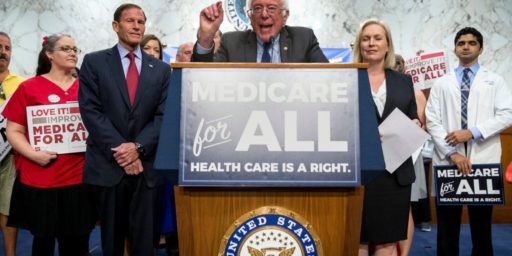ObamaCare Mission Creep
Reason‘s Nick Gillespie does his best John Stossel impression in explaining why whatever winds up in the final compromise health care bill will be just the beginning.
[Y]ou don’t have to side with those who warn of euthanasia classes to recognize that government programs often end up doing all kinds of things that weren’t in politicians’ original plans. Call it mission creep. Politicians pass a program, and then the scope of the program grows and changes.
It’s happened with everything from state-level health insurance plans to the Troubled Asset Relief Program. TARP’s original mission was spelled out in its name—the government would purchase troubled assets from financial institutions. However, just over a year later TARP’s mission has exploded, and billions in TARP funds have gone to bail out General Motors, Chrysler, and struggling homeowners. TARP money may even fund another stimulus.
He’s right that Social Security, the war on drugs, TARP and other programs radically evolved from their original intent. Lobbying, a bureaucracy run amok, and lack of Congressional oversight are all part of the problem. So are unintended consequences, like the well-intentioned requirement that insurance plans cover exotic alternative treatments making everyone else’s premiums less affordable.
Frankly, however, that’s the least of the problem with this particular bill. The reason this thing will morph, rather quickly, into something else is that it doesn’t solve the problems that it set out to solve and for which real political and economic pressures will remain. First, we’ll still have millions of uninsured people. Second, health costs are still going to be rapidly accelerating into unsustainable territory.
via Glenn Reynolds






“He’s right that Social Security, the war on drugs, TARP and other programs radically evolved from their original intent.”
Don’t forget Iraq and Afghanistan!
“The reason this thing will morph, rather quickly, into something else is that it doesn’t solve the problems that it set out to solve and for which real political and economic pressures will remain. ”
That may be. But if you’re waiting for the Republicans to do anything about it, keep waiting…
We could always do the smart thing and adopt single-payer health insurance, since that’s what every other advanced nation has and they all get better health outcomes than we do with lower per-capita spending while covering 100% of their populations.
Didn’t Bill Clinton advise passing anything and then coming back later to fix it? There’s the mechanism for mission creep alright.
Nobody wants this, it doesn’t accomplish anything, and it will bankrupt us. Let’s hope it does prove to be unconstitutional.
People without insurance want this, it will insure almost everyone who really wants insurance and it adds a relatively small amount to the budget. (Actually, it is unclear to me who will not be covered and why. Anyone have a link?) For those of us with insurance, it means that rescission cannot affect us. It means that people with illnesses will be able to get insurance.
What it does not do is definitively address costs. It sets up pilot programs to to address costs, which may be a better way to go as the health system is so large and so complex, that for any proposed solution, I can think of many reasons why it will not work, which means that brighter people can se those also. I would rather find out what works, then expand it.
Steve
“it will insure almost everyone who really wants insurance” And forces those who don’t want insurance to get insurance.
As I posted earlier. The majority of the 30 million uninsured already qualify for government insurance, millions more could afford to buy insurance but choose not to, and the number not covered undre the new legislation adds up to the estimate of the really unable to get insurance – about 18 million.
…of course there will be mission creep,we are going to have to fix the bill that the republicans and blue dogs screwed up.
Rick, how about constructive comments versus partisan pot shots? You might start with this link to give you another perspective.: http://online.wsj.com/article/SB10001424052748704398304574598130440164954.html
Pete,
I’m sorry but the best shot at bending the cost curve was a non starter for Republicans and Blue dogs so it had to get taken out. That will have to be fixed later, they had a chance at being constructive and they blew it so score partisan political points wit the mouth breathing Tea bag set who, as a group are nothing more then a walking blathering bag full of hypocrisy and contradictions.
I don’t have to read the WSJ to know that they will claim it’ is a takeover by the government, cost too much, reduce choice (as if anyone has choice now) blah blah blah. I’ve read both sides and am more convinced then ever that the only way to contain costs and deliver the most health care, to the most people at the lowest price is single payer but you know what … we don’t get what we want.
But don’t start pointing fingers and screaming that i’m just a partisan tool when you know as well as I do that a much better bill (or at least a much more coherent bill) would have come out of the senate if it were not for the new threshold of 60 votes that is now required to pass laws in that house. Good luck when you get it back because a 60 vote majority of true “conservatives” will be more difficult to cobble together than 60 moderate democrats.